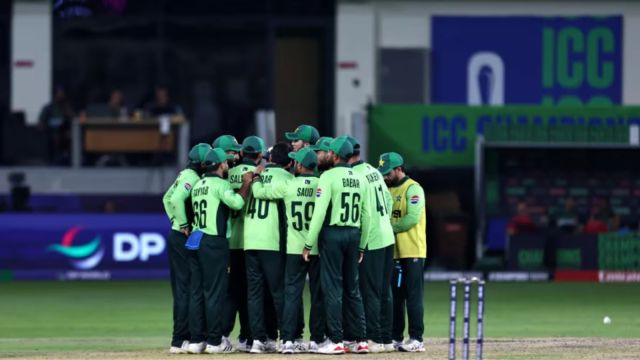
Pakistan exited the 2025 Champions Trophy without securing a single victory in the group stages. Meanwhile, a suicide bombing in Khyber Pakhtunkhwa claimed the life of a prominent politician and Islamic scholar, raising concerns over the rise of an offshoot of the Islamic State terrorist group. Law and order in Bangladesh remains a pressing issue, with citizens and media expressing growing frustration.
The Daily Times, in its February 28 editorial titled ‘Abandoned!’, laments, “What is Pakistan’s cricket story? A disgraceful exit from an event long-awaited, that too, on its home ground? A pinching diktat that we kept missing the stations on too many occasions to the point that there’s no upturn left?” The editorial paints a bleak picture of Pakistan’s Champions Trophy campaign: “For the Men in Green, this unceremonial exit should be a sombre reflection of a broken cricketing dream, marked by mismanagement, lacklustre performances, and a failure to rise to the occasion when it mattered most. Watching the matches felt less like cheering for a national team and more like witnessing a tragic farce unfold on the global stage.” It concludes with questions for its cricketing establishment: “Where was the plan for countering aggressive bowling attacks? Why did batting strategies falter against teams that exploited our weaknesses? These questions cling to the hearts of fans who deserved far better.”
Dawn, in its February 28 editorial, highlights the deep ties between cricket and politics in Pakistan: “Cricket in Pakistan cannot — and should not — be divorced from politics. It is the country’s most popular sport, monopolising the majority of the sports budget, dominating advertising revenue, and commanding immense public attention. Played largely against Pakistan’s former Commonwealth counterparts, cricket has long been a source of national pride and identity.” Demanding an “inquest”, the editorial delivers a scathing critique of the cricket-politics nexus: “In a country where patronage politics has systematically undermined institutions, cricket is no exception. The domestic structure is in shambles. Former cricketers wield outsized influence, and the real prize is not national performance but the perks and privileges that come with being part of the cricketing establishment. This inquest must not only happen but must happen swiftly.”
Dawn, in its March 1 editorial, writes, “The bombing of Darul Uloom Haqqania in KP’s (Khyber Pakhtunkhwa) Nowshera district on Friday marks a departure from the recent trend of militants targeting mostly security personnel and government officials.” While no group has claimed responsibility, the Afghan Taliban have suggested that the self-styled Islamic State may be involved. The editorial further notes, “There is, of course, no love lost between the Afghan Taliban and IS, but from Pakistan’s point of view, if the attack were indeed traced to IS, it would signal a fresh security challenge in KP. Already the province, as well as parts of Balochistan, are witnessing frequent terrorist activity believed to be carried out by the banned TTP and affiliated groups. IS is an equally — if not more — ferocious entity, with global pretensions and a medieval, sectarian outlook.” However, the editorial concludes that the “attack also offers an opportunity for Islamabad and Kabul to work together against a common, and highly dangerous, foe.”
The Nation, in its March 1 editorial, writes, “The death of Maulana Hamidul Haq Haqqani, Vice-Chancellor of the renowned Jamia Darul Uloom Haqqania seminary, in a suicide blast assassination… is a serious setback to the fragile negotiations between Pakistan and Afghanistan aimed at resolving their longstanding disputes through diplomacy.” The editorial underscores his significance in peace efforts, stating, “He had led delegations to Afghanistan, using his religious influence to facilitate dialogue between the two nations. While his efforts had mixed results, his ability to bridge the gap between the two sides made him a crucial figure in peace talks.” It also raises critical questions surrounding his assassination: “Who was behind this attack, and what were their motives? Was it an attempt to derail Pakistan-Afghanistan dialogue? Was it the work of splintered militant factions seeking revenge? Or was it part of a larger conspiracy?”
Expressing concern over Bangladesh’s security situation, The Dhaka Tribune, in its February 25 editorial, writes, “Time and time again, ever since the fall of the Awami League regime and the interim government taking charge last August, there has been one resounding criticism amidst the numerous positives — the dire state of law and order in the country.” The editorial further laments the necessity of heavy patrolling, concluding, “While it is unfortunate that our capital has come to a point where we need regular patrolling to monitor the situation, nothing is more important than restoring law and order and ensuring that citizens are safe.”
Similarly, Prothom Alo, in a February 26 editorial, asserts, “It must be acknowledged that the government’s previous measures to curb crime were not adequate. Even the much-discussed ‘Operation Devil Hunt’, launched against criminal activities, has failed to convey any positive result in the past weeks.” The editorial highlights a systemic issue exacerbating the problem: “Many believe that approaching law enforcement will yield little benefit. Furthermore, individuals attempting to file cases at police stations often face various forms of harassment. Numerous victims have reported that when they tried to lodge complaints about incidents of mugging, the officers on duty refused to register the case, insisting that the incident be recorded as theft instead. This is because police officers receive rewards for fewer registered cases and are reprimanded if the numbers are high. Given this system, why would officers willingly subject themselves to reprimand?”
saptarishi.basak@expressindia.com